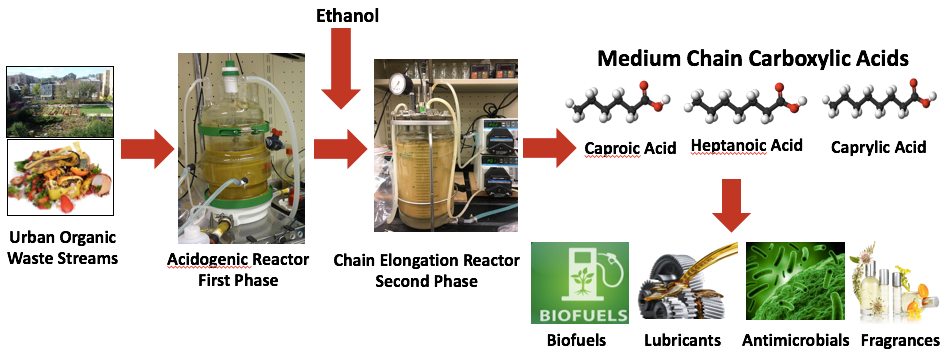Production of medium chain carboxylic acids from urban organic waste streams using anaerobic fermentation technology
Faculty advisor: Lutgarde Raskin
Post-doctoral fellow: Kuang Zhu, Xavier Fonoll
PhD student: Diana Kitt, Pedro Puente, Shilva Shrestha
Master’s student: Brittany Colcord
Visiting Scholars: Maxim Muermans, Tjok Jan Meuwissen
Undergraduate student: Lucy Aley, Tina Lin
Funding: NSF SRN (Sustainable Research Network, 1444745), DOE SBIR (Small Business Innovation Research, DE-SC0018745), DOE BETO, REFRESCH (Global Challenge for the Third Century program)

Annual worldwide waste generation is expected to increase by 70% from 1.3 to 2.2 billion tons from 2012 to 2025. Simultaneously, there has been a paradigm shift in approaches to waste treatment, transitioning from simple landfill disposal or incineration to utilizing waste streams to produce fuels and high value chemicals. Production of high value fermentation products such as medium chain carboxylic acids (MCCAs) via chain elongation of short-chain carboxylic acids (SCCAs) is gaining attention for resource recovery from waste streams. MCCAs can be used as the precursors for liquid fuels, as animal feed additives, antimicrobials, fragrances, pharmaceuticals, and dyes. Anaerobic microbial communities can efficiently convert organic waste, despite its complexity and heterogeneity, into useful products. The inputs for chain elongation, SCCAs and ethanol, can both be produced from waste streams.
A two-phase anaerobic bioreactor system is being used to maximize the production of MCCAs. The first phase bioreactor hydrolyzes lignocellulose rich organic waste such as food waste and subsequently ferments the soluble products to SCCAs such as acetate. The system mimics the physicochemical conditions of the rumen (cow stomach) for efficient hydrolysis. SCCAs produced in the first phase act as precursors for MCCAs production in the second phase chain elongation reactor. The research team is exploring various strategies to shape anaerobic microbial consortia to increase the MCCAs yield and selectivity. The overall goal of this project is to develop a flexible bioreactor system that can produce high value products from different organic wastes generated in urban settings.
Contact: Shilva Shrestha ([email protected]) and Xavier Fonoll ([email protected])
